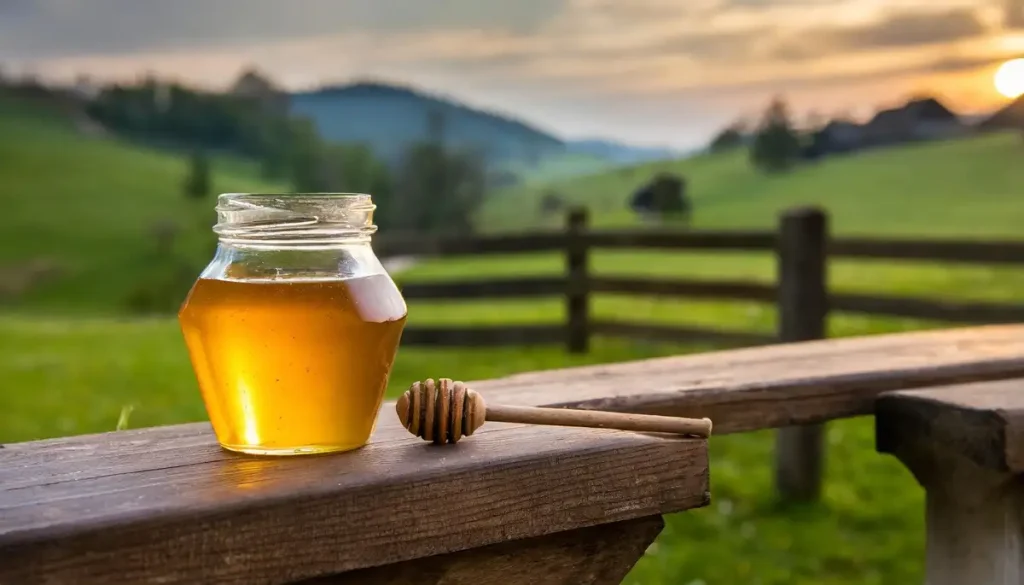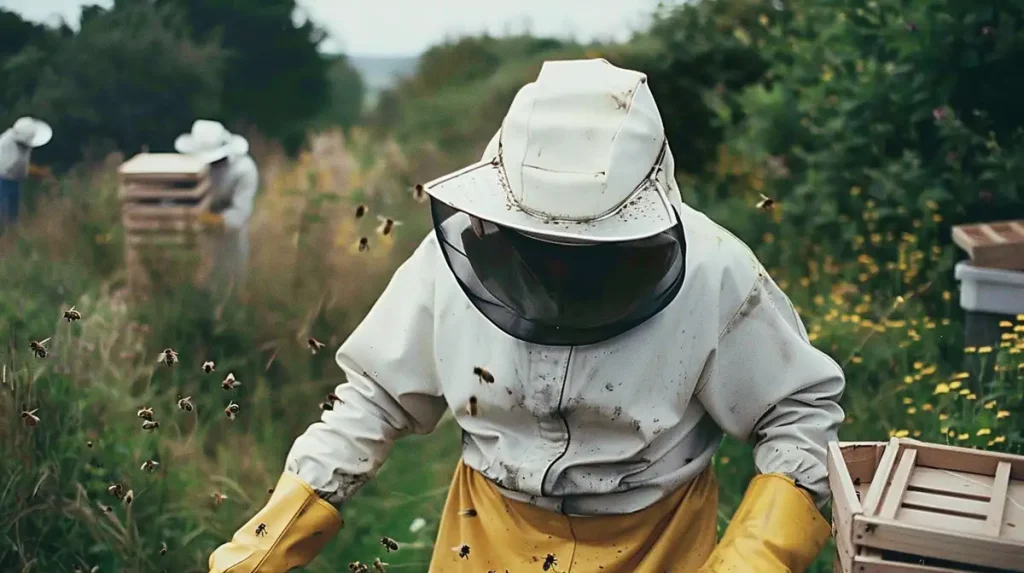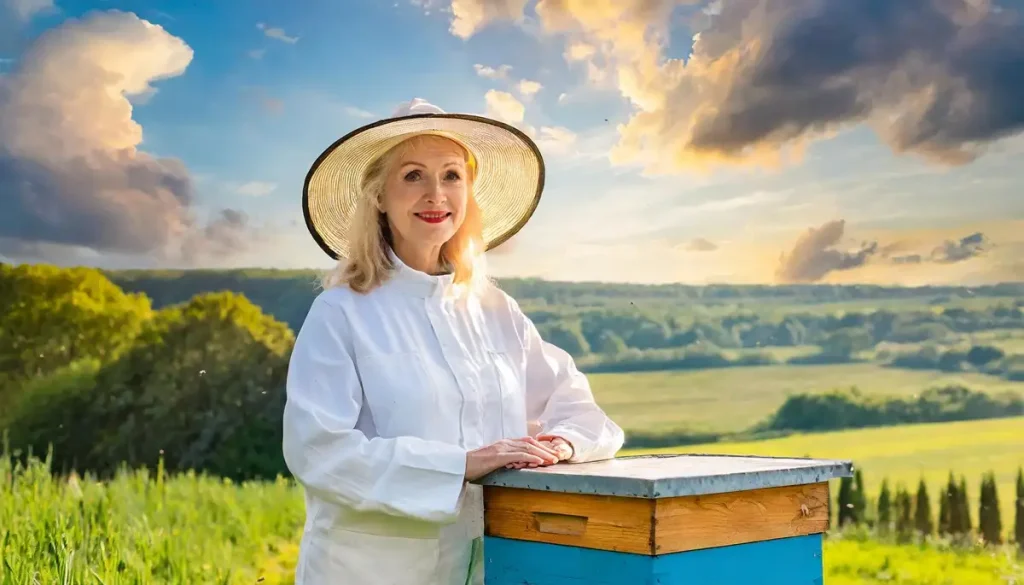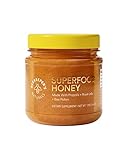Table of Contents
Beekeeping is increasingly being taken up as an amateur hobby. This can be attributed to many factors, ranging from increased awareness of the importance of bees within the ecosystem to the ready availability of the bees and beginner equipment accessible for purchase. Some may catch a local swarm, some may purchase a number of bees and work to socialize them into a colony. The point is that many people do it, and not least because of certain health benefits.
That’s right, beekeeping can be incredibly beneficial to your general health. Beekeeping is both the work you put in and the harvest you reap (obviously primarily honey, but other substances too). Both have health benefits, the former therapeutic, the latter nutritional. It certainly casts bees as one of the more benign creatures on our planet that both the care of them and their produce hold potential health benefits for humans.
Before getting into my list of the 8 specific benefits though, it might be worth spilling some words on the benefits of simply having a hobby. Beekeeping can be a very serious endeavor involving much hard work (as well as attendant satisfaction), but increasingly people are engaging with it as a hobby instead. A hobby offers an outlet for stress (and encourages so-called “eustress”, or positive stress), gives you a sense of both the challenge and the satisfaction, and is even linked to health benefits as disparate as lower blood pressure and weight loss.
Here’s a table summarizing the eight main health benefits of beekeeping:
| # | Benefit | Description |
|---|---|---|
| 1 | Mental Health Benefits | Engaging in beekeeping can be meditative and stress-relieving, fostering mental well-being through focused, calming activity. |
| 2 | Physical Exercise | Beekeeping involves physical tasks like lifting hives and frames, serving as a form of moderate physical exercise. |
| 3 | Fresh Honey Access | Direct access to fresh honey, known for its nutritional and medicinal properties, including digestive health benefits and antioxidant properties. |
| 4 | Exposure to Fresh Air and Nature | Beekeeping typically takes place outdoors, offering increased time in nature and fresh air, enhancing mood and increasing Vitamin D levels. |
| 5 | Allergy Relief | Consuming local honey, containing pollen from local plants, may help build immunity to seasonal allergies, acting as a natural form of allergy immunotherapy. |
| 6 | Improved Gardening and Biodiversity | Bees are essential for pollination, improving the health and diversity of local gardens and ecosystems, leading to a healthier environment. |
| 7 | Cognitive Benefits | Managing bee colonies involves learning and applying knowledge about bee biology and ecosystem management, potentially improving cognitive function. |
| 8 | Community and Social Interaction | Beekeeping often leads to community engagement and social interaction through local clubs or sharing of resources, benefiting mental health and social well-being. |
This table provides a concise overview of the various ways in which beekeeping can contribute positively to one’s health and well-being.
Opting to make your hobby beekeeping, however, offers many healthy benefits besides. Read on as I list 8 other ways that beekeeping and its by-products can make you a healthier, happier person. And starting with the obvious…
1. Honey
Specifically, your own. Perhaps the most famous health benefits that come along with beekeeping are those that come from the honey itself, a beekeeper’s primary product. Honey has great nutritional value, being rich in nutrients such as niacin, riboflavin, iron, and manganese. And because it is also deliciously sweet, many honey enthusiasts consider it a fine alternative to refined sugar. Honey is frequently added to beverages to help with sore throats and has also been shown to have antibacterial properties. A special mention is also due to the intense sense of satisfaction you will derive from harvesting and consuming your own honey. Honey is one of the nutritional benefits of beekeeping that dovetails with the psychological benefits, as being present at every stage of its development makes the end result profoundly satisfying.

2. Royal Jelly
Royal jelly is a substance produced by honeybees that is used to feed larvae and queen bees all through their respective lives. Indeed, feeding a larva a lot of royal jelly is how a queen is produced; this particular diet triggering the morphology of the queen bee. Unsurprisingly then, it is a pretty special substance, and few were surprised when it was found to be of massive nutritional value, with a list of components and attendant health benefits as long as your arm. It can be bought as a dietary supplement and it has been claimed to be effective as an antioxidant and a potential anti-inflammatory.
3. Propolis
Propolis is another little-known bee product that is nevertheless acknowledged as something of a superfood. Propolis is made from tree sap, which bees collect and mix with other substances to create a thick substance which is used to coat their hives. Although not a food for bees, it is another substance sold as a health food and dietary supplement. Being derived from sap, the precise content of propolis will be heavily influenced by the trees from which the bees have collected it. Nevertheless, the over 300 substances typically found within a sample of propolis are primarily polyphenols, which can bolster disease prevention and immuno-defense in humans.
4. Bee Pollen
Bee pollen is an interesting substance. It is the result of the pollen that bees collect and the other substances that are added to it before being stored in the hive. As pollen itself can vary in composition from flower to flower, and because bees will add further substances such as nectar, enzymes, honey, and wax, bee pollen can have an extremely variable composition. Containing over 250 active ingredients, bee pollen is a true super food and is frequently sold as a dietary supplement. Containing several substances with anti-inflammatory properties and being rich in antioxidants, it is one of the most widely sought-after bee products. The Federal Ministry of Health in Germany has even recognized bee pollen as a medicine.
5. Beeswax
From honey and royal jelly to propolis and pollen, the super healthy bee products that you can harvest from your hives do not stop there. Known for its practical application in the creation of candles and other products, beeswax has a serious reputation as a skincare product as well. After all the nutritional value of the other substances you can get from your hive, beeswax offers some cosmetic potential. Beeswax also has anti-inflammatory properties and can be used for a range of skin irritations.
6. Gratifying, Rewarding Work
Beekeeping at the amateur level is pretty relaxing. Bees can be left alone for extended periods, hives can be set up in any number of convenient locations, and limiting things to a few hives keeps the hard work at bay. That said, even at this level, beekeeping can be an enormously rewarding and gratifying pastime, with a host of psychological benefits associated with that. For one thing, the beekeeper becomes intimately connected with an ancient natural process from start to finish. If a hive grows, there is a similar sense of development and the harvest of honey has a real feeling of achievement to it (see below). Beekeepers are more connected to nature, and you can even taste the effect of the local flora in the honey that is ultimately produced. Being placed in such a position of care for both a community of creatures and the immediate natural environment upon which they depend can be an exceptionally rewarding experience.
- Carter, Anthony (Author)
- English (Publication Language)
- 194 Pages - 02/28/2024 (Publication Date) - Independently published (Publisher)

7. The Satisfaction of Achievement
The last entry concerned the tendency of beekeeping to foster a sense of connectedness with, and care of, the natural world. However, beekeeping is also a past time where ambition is rewarded with the potential for success. If a sense of rolling achievement is important for your mental wellbeing, you could scarcely do better than beekeeping. An amateur beekeeper can expect some honey after a couple of years but, if you are in the business of expansion, the sky’s the limit as you create new hives, trap new swarms, and generally try to increase production of honey and the other substances mentioned above. It is very possible to set targets in beekeeping – year on year – and to experience the deep sense of satisfaction in achieving them.
8. Bee Sting Immunity
This entry represents a remarkable phenomenon, and one that could certainly be counted as a health benefit – but it comes with a huge disclaimer. If you are allergic to bee stings, extreme caution is obviously due around bees. Bees are not aggressive but having an allergy, naturally enough, means a whole new set of rules. That said, for those beekeepers who have been stung a few times (perhaps the smoker wasn’t as enthusiastically applied as would have been ideal, or maybe the beekeeper was a bit rough when handling the hive) it has been widely reported that an immunity to the sting develops. For many long-term beekeepers, this turns out to be one very useful health benefit indeed.
Health Benefits of Beekeeping – Conclusion
To conclude, beekeeping offers a wide range of health benefits for both the bees and their human keepers. From promoting physical activity and reducing stress to providing a source of natural, nutrient-rich food, beekeeping has been shown to have numerous positive impacts on human health and wellbeing. By providing a connection to nature and promoting a sense of community, beekeeping can help to reduce feelings of isolation and depression, especially in urban environments. Additionally, the process of managing hives, harvesting honey, and caring for bees can promote physical activity and improve cardiovascular health. Bee products such as honey, propolis, and royal jelly have long been used in traditional medicine for their antibacterial, antifungal, and anti-inflammatory properties, and have been shown to have a range of health benefits, including improved wound healing, reduced inflammation, and enhanced immune function. Furthermore, beekeeping can also have positive impacts on the environment, such as promoting pollination and contributing to the conservation of bee populations. Overall, beekeeping offers a unique and rewarding way to promote health and wellbeing for both humans and bees. With the right knowledge, skills, and dedication, anyone can become a successful and passionate beekeeper and reap the many benefits that come with this fulfilling hobby.
Looking to up your beekeeping game? Check out our latest product recommendations so you can take things to the next level!
Introducing The Top 12 Best Beekeeping Veils For 2024
Introducing The Top 20 Best Beekeeping Gloves For 2024
Introducing The Absolute Best Beekeeping Suits For 2024
The 15 Top Beekeeping Books for 2024
The Top 11 Honey Extractors for 2024
The Top 12 Mason Bee Houses for 2024
Beekeeping Disclaimer:
Beekeeping, like any agricultural activity, involves inherent risks. It is important to understand these risks and take appropriate measures to mitigate them.
Potential risks associated with beekeeping include:
- Bee stings: Honey bees are generally not aggressive but can become defensive if they feel threatened or their hive is disturbed. Bee stings can cause allergic reactions or even anaphylaxis in some individuals, which can be life-threatening. It is important to wear protective clothing and follow best practices when handling bees to minimize the risk of stings.
- Diseases and pests: Bees can be vulnerable to various diseases and pests, including mites, viruses, and bacterial infections. These can have significant impacts on bee colonies, leading to reduced honey production or even colony collapse. It is important to monitor hives regularly and take appropriate measures to prevent and treat diseases and pests.
- Weather conditions: Extreme weather conditions, such as drought or cold temperatures, can affect the health and productivity of bee colonies. It is important to ensure that hives are appropriately sheltered and provided with adequate food and water.
- Environmental hazards: Bees can be affected by environmental hazards such as pesticide exposure, pollution, and habitat loss. It is important to be aware of these hazards and take appropriate measures to protect bee colonies and promote healthy environments for bees.
- Legal requirements: Beekeeping may be subject to local, state, or national regulations, such as registration or inspection requirements. It is important to be aware of these requirements and comply with them.
While beekeeping can be a rewarding and enjoyable activity, it is important to be aware of the potential risks and take appropriate measures to mitigate them. By following best practices and staying informed about the latest developments in beekeeping, beekeepers can help ensure the health and productivity of their hives and contribute to the well-being of bee populations worldwide.
Disclaimer (honey or bee produce)
If you have a known allergy to honey or any other bee produce, it is important to be aware of the potential risks associated with consuming or using these products. Honey and other bee produce such as pollen, propolis, and royal jelly can cause allergic reactions in some individuals, ranging from mild symptoms to severe, life-threatening reactions.
If you are unsure whether you have an allergy to honey or other bee produce, it is recommended that you consult with a medical professional before consuming or using these products. Additionally, it is important to carefully read labels and ingredient lists on food and personal care products that contain honey or other bee produce, as they may trigger an allergic reaction.
This disclaimer is not intended to diagnose, treat, or cure any medical conditions. It is provided for informational purposes only and should not be relied upon as medical advice. If you experience any adverse reactions after consuming or using honey or other bee produce, seek medical attention immediately.
Medical Disclaimer: The content provided in this blog post is for informational purposes only and is not intended as medical advice, or to replace the advice of a healthcare professional. Bee stings can cause allergic reactions in some individuals, which can be severe and require immediate medical attention. Similarly, consuming bee products, including honey, pollen, propolis, and royal jelly, can cause adverse reactions in people with specific allergies or intolerances. If you experience any negative reactions or are unsure about your allergies, consult with a healthcare provider promptly. The views expressed in this article are based on current knowledge and do not cover all possible health implications. Always seek the advice of your physician or another qualified health provider with any questions you may have regarding a medical condition or before starting any new treatment.
Last update on 2024-04-18 / Affiliate links / Images from Amazon Product Advertising API




